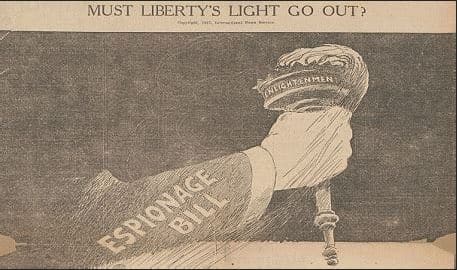
(See Jacob Hornberger speak live at the Ron Paul Institute’s Sept. 3rd Washington Conference!)
For some 140 years, the United States did not have an Espionage Act. It didn’t come into existence until 1917, when US officials used it to punish Americans who had the audacity to question the US intervention into World War I, an intervention that ultimately led to the rise of the Hitler regime in the 1930s.
No one can deny that the United States did not fall into the ocean during those 140 years when it didn’t have an Espionage Act. So, the question naturally arises: How did the country survive without an Espionage Act for almost a century and a half?
Just think: The whole world was free to spy on America without fear of being prosecuted, convicted, and incarcerated by US officials. Think about how scary that must have been for all those Americans who were living during those 140 years.
After all, everyone knows that the whole world wants to spy on America. And without an Espionage Act, we all know that everyone in the world would spend large portions of their lives and fortunes spying on America.
There is no question but that throughout the world, there have to be secret files that contain information that spies came up with during those 140 years. Isn’t it amazing that so few of those files has yet surfaced? They have got to be out there somewhere. Surely, all those spies kept records of what they saw when they spied on America.
And don’t forget that for most of that time, the United States had a policy of open borders with respect to foreigners who wished to come here to live or just to visit. That means that spies galore must have flooded into the United States during that period of time.
What possibly could they have been spying on? Well, they could have sat in on congressional sessions to see what Congress was up to. Or they could have monitored the president’s activities, such as who he was meeting with and playing golf with. Or they could have been spying on the Supreme Court to see what cases they were working on. Or they could have visited some of the few military installations in the country. They couldn’t have been spying on the CIA or the NSA because Americans lived without those two totalitarian-like institutions until the Cold War racket came into existence after World War II. Or they could have been spying on the activities of the American people — things like cattle roundups or cross-country train trips..
What’s amazing about all this is that it doesn’t seem that our Americans ancestors were terribly scared about being spied on, as today’s Americans are. In fact, it’s obvious that they really didn’t care if foreigners were spying on them.
Ironically, it seems that when the federal government began doing bad things, such as intervening in foreign conflicts that were none of its business or engaging in dark-side communist-like activity like state-sponsored assassinations, that US officials became obsessed with people spying on the US Could it be that were concerned that the spies would uncover their nefarious and dark-side activity and circumvent it, object to it, or report it to the world?
After all, what if you were planning a coup against a foreign regime, one that would oust the country’s democratically elected ruler and replace him with an unelected military brute. Would you want spies to be be able to uncover your plans and possibly foil them? Of course not.
Or imagine that you were planning the assassination of some foreign leader. Would you want spies to be be able to uncover your plans before you were able to complete them? Of course not.
This notion is buttressed by the fact that US officials today are using this dinosauric World War I law to prosecute Julian Assange and Edward Snowden. I suppose the theory is that by disclosing the US national-security establishment’s dark-side activity to the world, they were “spying” because the information they disclosed ultimately reached foreigners through media coverage of the wrongdoing they disclosed.
Ironically, the US government doesn’t have anything against spying per se, given that it spies extensively on foreign countries. It’s only foreigners who spy on the United States who are considered to be bad people.
World War I was one of the biggest fiascoes in American history. It resulted in the senseless deaths of tens thousands of American men, many of whom had been forced to kill and die in the intervention. It has brought the destruction of the civil liberties of the American people during the war. The Espionage Act is a fruit of that poisonous endeavor. It is time to bury it by repeal. If the United States could survive for 140 years without an Espionage Act, it can survive another 140 years without one.
Reprinted with permission from Future of Freedom Foundation.

